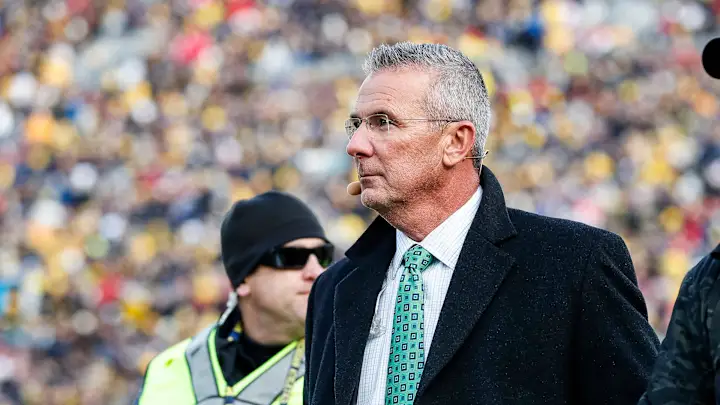Urban Meyer recalls threatening to quit Ohio State over push back for idea to hold ‘church service’ for team

Urban Meyer, a name synonymous with college football greatness, has left an indelible mark on the sport through his coaching success. Leading programs like Florida and Ohio State, Meyer became known for his fiery demeanor, meticulous planning, and ability to win championships. However, behind the championship trophies, remarkable comeback victories, and unforgettable seasons, there are lesser-known stories that reveal a different side to the legendary coach.
One such story revolves around an instance during his tenure at Ohio State, when Meyer found himself at odds with the administration and staff over a highly personal and somewhat controversial idea. In an unexpected and candid reflection, Meyer recalls threatening to quit his position as the head coach at Ohio State over a disagreement related to a “church service” for his football team. This revelation sheds light on the complexity of Meyer’s leadership style and his unwavering dedication to the well-being and development of his athletes.
While the incident may seem minor in the grand scope of his storied career, it underscores the deep commitment Meyer had to the emotional, spiritual, and personal growth of his players. His approach to coaching went far beyond drawing X’s and O’s on a whiteboard. For Meyer, shaping young men into well-rounded individuals was just as important as preparing them for success on the football field. This tension between his vision for the team and institutional pushback, however, led to one of the more surprising moments of his coaching career.
In this article, we’ll delve deeper into the specifics of the incident, the tension surrounding Meyer’s proposal for a team-wide church service, and how this moment ultimately reflects the broader themes of his tenure at Ohio State, including his values, leadership style, and the challenges he faced navigating a highly scrutinized and publicized position.
The Idea of a Team “Church Service”
For those who have followed Urban Meyer’s career, it is no surprise that his approach to coaching often involved instilling values beyond just football. Known for his strong faith, Meyer has never shied away from discussing the importance of religion and spiritual growth in his personal life. Throughout his coaching journey, he made efforts to incorporate elements of his religious beliefs into his programs, with a particular focus on fostering a sense of unity, accountability, and moral character in his players.
One such effort involved the idea of holding a team “church service” for his Ohio State Buckeyes. Meyer envisioned this service as a way to bring the team together spiritually, offering his players an opportunity to reflect, bond, and strengthen their emotional and mental resilience off the field. His philosophy was rooted in the belief that a strong sense of faith and community would lead to stronger team dynamics and, ultimately, greater success on the field.
Meyer’s intentions were clear: he wanted to build a team that was united not only by their passion for football but also by shared moral and spiritual principles. To him, the service would serve as an important reminder of the bigger picture, one that transcended the game and reminded the players of their responsibilities as individuals in society. He believed that such initiatives helped foster a deeper sense of loyalty, discipline, and personal growth—traits that he felt were essential for achieving success both on and off the field.
However, despite his well-meaning intentions, Meyer was met with pushback from various quarters of the Ohio State program, which set the stage for a tense moment in his coaching tenure.
The Pushback from Ohio State Administration
When Meyer pitched the idea of holding a team-wide church service to the administration, it was met with skepticism. For many, the concept of a coach proposing such a service raised concerns about the potential separation of church and state, particularly in the highly regulated and public realm of college athletics. The idea of mixing religion with a public university’s sports program triggered a chain reaction of debates over boundaries, respect for diversity, and the institution’s policies surrounding religious expression.
For many administrators, this was uncharted territory. As a public institution, Ohio State had to tread carefully to ensure that religious activities did not conflict with its commitment to inclusivity and respect for students’ various backgrounds and beliefs. There was concern that the service might inadvertently alienate some players, particularly those who did not share the same religious convictions as Meyer. In a time when the spotlight on college sports has never been more intense, this was a potential PR issue the administration didn’t want to deal with.
It wasn’t just about the potential fallout from religious freedom concerns—it was also about the broader implications for college athletics. College football is not only a game; it is a multi-billion-dollar business with a high-profile national stage. Every decision, no matter how well-intentioned, could be scrutinized by the public, media, and other stakeholders.
For Meyer, this response was perplexing. He felt that the church service was in line with his vision for the team and his broader philosophy of coaching. He believed that instilling spiritual strength in his players was just as important as the physical and mental strength needed to succeed on the football field. The tension quickly escalated, and Meyer found himself in a situation that challenged his position at the university.
Meyer’s Threat to Quit
As Meyer recalls, the friction between his desire to hold the church service and the resistance from Ohio State’s administration grew intense. At one point, Meyer, feeling cornered and deeply committed to his vision for the team, threatened to quit. His reasoning was simple: if he could not lead his team in the manner that he believed was best for their overall development—spiritually, emotionally, and mentally—then his tenure at Ohio State would be untenable. Meyer was not one to compromise on his core principles, and he saw this as a matter of deep personal conviction.
The public threat to leave the program undoubtedly sent shockwaves through the Ohio State administration. Meyer had already delivered a National Championship and several successful seasons at Ohio State, and his leadership had turned the program into one of the premier teams in college football. Losing him was unthinkable, and the pressure on the administration mounted.
However, Meyer was resolute in his stance. He viewed his relationship with his players as one that transcended the standard coach-athlete dynamic. He was not just responsible for developing football players—he was responsible for developing young men who would go on to contribute positively to society. For him, the church service was part of that holistic development, and he was unwilling to compromise on that vision.
Ultimately, the tension reached a tipping point, and the administration backed down. Meyer was allowed to hold the church service, and it was clear that his commitment to his players and his beliefs was unshakable.
A Defining Moment in Meyer’s Career
This incident, while not widely publicized at the time, serves as a powerful reminder of the complexities of coaching at the highest level. For Urban Meyer, it was a defining moment in his career—a time when he had to choose between his vision for his program and the expectations of the institution that employed him.
Meyer’s commitment to his players went beyond the X’s and O’s of football strategy. It was about shaping the character and integrity of his athletes. This story serves as a testament to the fact that Meyer’s approach to coaching was rooted in core values, not just the pursuit of victories on the football field.
While Meyer’s coaching career is filled with highlights, championships, and controversy, this moment stands out as a reminder that his motivations were always about much more than just winning games. His decision to hold the church service, and the pushback he received, showed the delicate balancing act that coaches face between upholding their personal values and adhering to the expectations of the institutions they represent.
A Legacy of Faith and Leadership
Urban Meyer’s story is one of determination, resilience, and unwavering commitment to his players. Whether he was coaching at Florida, Ohio State, or any other program, Meyer’s focus was always on developing the whole person, not just the athlete. The church service incident is just one example of the broader themes that defined his coaching philosophy.
Throughout his career, Meyer faced many challenges, both on and off the field, but his ability to overcome adversity and stay true to his principles has shaped the legacy he leaves behind. His willingness to stand up for what he believed in—whether it was a controversial church service or a difficult coaching decision—speaks to the core of who he is: a leader who is unafraid to take a stand for the people he cares about.
As we look back on Urban Meyer’s career, this story of his threatened resignation offers a glimpse into the complexities of coaching at the highest level. It reminds us that behind every championship and every victory, there is a coach who is deeply invested in the growth and success of his players, both on and off the field. And for Urban Meyer, that meant sometimes challenging the status quo, even if it meant risking it all.









